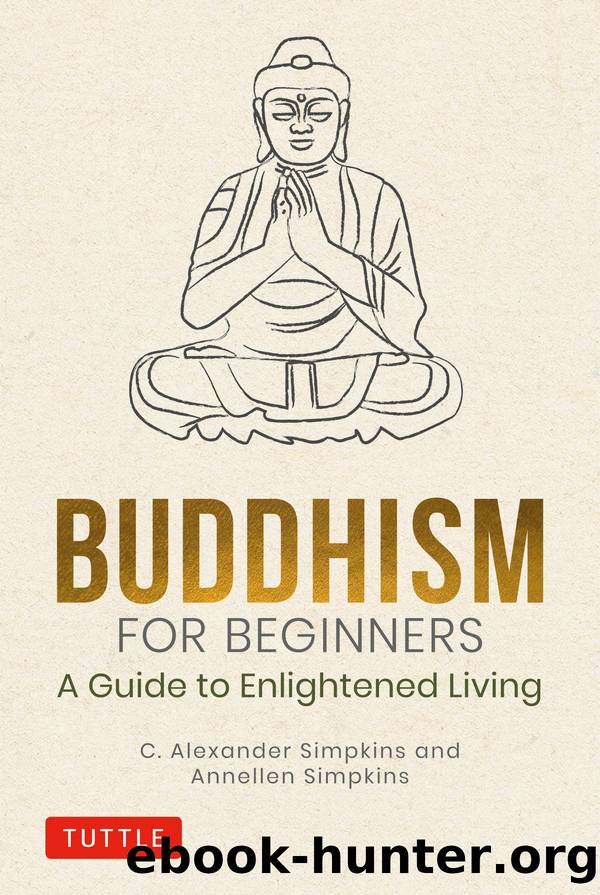Buddhism for Beginners by C. Alexander Simpkins

Author:C. Alexander Simpkins
Language: eng
Format: epub
Publisher: Tuttle Publishing
8
Nirvana: A New Experience
If they only realized it, they are already in the Tathagataâs Nirvana, for, in Noble Wisdom, all things are in Nirvana from the beginning.â
âThe Nirvana Sutra
If relief from suffering seems negative, is there nothing positive in life to seek? Is everything merely illusion, or is something more to be found in our lives? Buddhism offers the hope of something better. A different view of life appears on the horizon of consciousness. A new way to experience is born that enhances the ability to cope with suffering, even transcend it: nirvana.
What is this new experience? What makes it so different, so unique that the impossible becomes possible, the unsolvable can be solved? The answer is found in Buddhismâs unique logic.
We have a long tradition in the West of problem-solving that is based in scientific reasoning and Aristotelian logic. Our culture is firmly rooted on this basis. An object or situation exists or does not exist. Cause leads to effect, premises lead to conclusions. For example, I am sitting in a chair, writing. From the usual perspective, this chair is solid and belongs to a certain class or category: a hand-crafted modern chair. We believe we understand an object when we can define and classify it in a category. We take this for granted. We can describe the chair to others. They know what to do with itâsit in itâas with all members of the category chairs. And as the renowned philosopher Bertrand Russell explained, a category is not a member of itself. So I do not sit on the category chairs, an abstraction. I am sitting on this particular handcrafted chair. It is an actual chair, an object, not an abstraction.
But Buddhist doctrine suggests that when we classify and reason about chairs in this way, we are perceiving our thoughts, not the real world. We think we know an object by its category, but we do not. We only know the category. We could sit on a desk, on the floor, or on the ground.
A wonderful experience awaits us when we free ourselves from the limitations of our categories. Since all are chairs, there is no chair! The category chairs is an illusion. Anything can be a chair when we sit in meditation.
Problems occur when consciousness attempts to grasp a situation with a narrow, limiting perspective. Enlightenment promises to liberate us from these confines, to allow us to use more of our potential.
LIFE IS CHANGE
Nothing is able to exist for more than a fraction of time. We look at ourselves in the mirror today and feel an identity, but soon we grow old. We change. We may discuss our views, asserting âThis is what I think, really, and this is who and what I am.â But a year from now, or ten years from now, will we still think the same? Or do we change our views as we travel through the developmental stages of life? At one point in history, no one believed that people could fly. Yet today, anyone can fly using an airplane.
Download
This site does not store any files on its server. We only index and link to content provided by other sites. Please contact the content providers to delete copyright contents if any and email us, we'll remove relevant links or contents immediately.
The Way of Zen by Alan W. Watts(6590)
Ego Is the Enemy by Ryan Holiday(5407)
The Art of Happiness by The Dalai Lama(4120)
The Book of Joy by Dalai Lama(3966)
Why Buddhism is True by Robert Wright(3441)
Spark Joy by Marie Kondo(3296)
Shift into Freedom by Loch Kelly(3192)
Happiness by Matthieu Ricard(3037)
A Monk's Guide to a Clean House and Mind by Shoukei Matsumoto(2901)
The Lost Art of Good Conversation by Sakyong Mipham(2638)
The Meaning of the Library by unknow(2563)
The Unfettered Mind: Writings from a Zen Master to a Master Swordsman by Takuan Soho(2293)
The Third Eye by T. Lobsang Rampa(2255)
Anthology by T J(2202)
Red Shambhala by Andrei Znamenski(2180)
The Diamond Cutter by Geshe Michael Roach(2058)
Thoughts Without A Thinker: Psychotherapy from a Buddhist Perspective by Epstein Mark(2007)
Twilight of Idols and Anti-Christ by Friedrich Nietzsche(1886)
Advice Not Given by Mark Epstein(1875)
